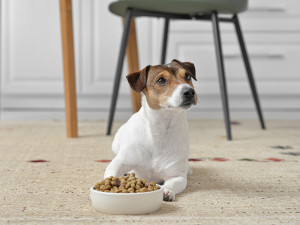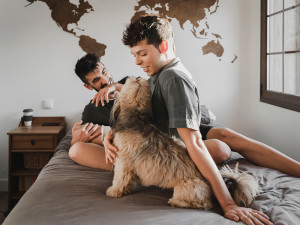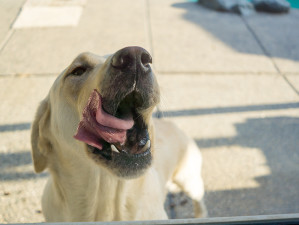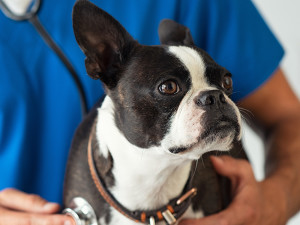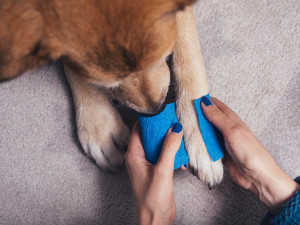Vet-Approved Diarrhea Treatments
Shudder. It happens to all of us.
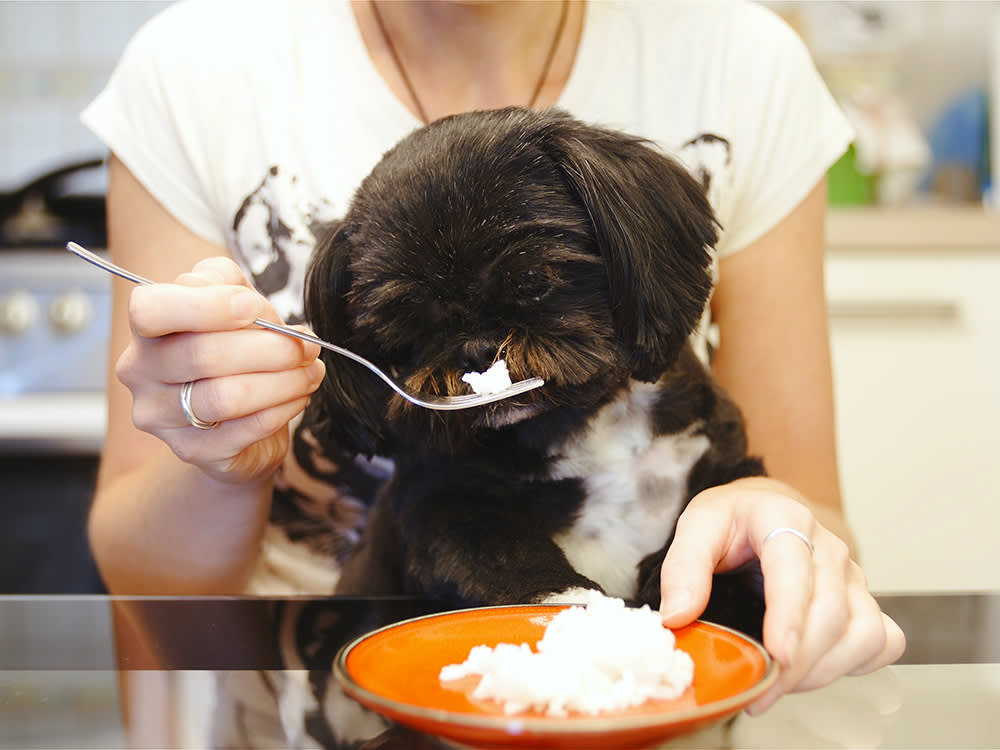
Share Article
In This Article:
Pet Diarrhea Treatment Options Over-the-Counter Treatments for Diarrhea in Dogs Natural Treatments for Diarrhea in Dogs Prescription Diarrhea Medications for Dogs and Cats
Dog diarrhea: We don’t want to talk about it. We don’t want to look at it. We definitely don’t want to touch it. Our dogs’ diarrhea is definitely not the most adorable thing about them, but s*it happens. As much as we don’t want to, we have to deal with it.
What is dog diarrhea?
Dog diarrhea is possibly the most common complaint received by veterinarians. It’s such an easy condition to identify (the smell, the texture, you get it) and is something pet parents want resolved quickly. Minor gastrointestinal problems are common and can usually be treated at home safely and effectively. Despite this, there are dogs whose stomach problems, if not addressed early enough by a veterinary professional, cause them to suffer more than they need to. Find out the causes of dog diarrhea, how to stop it, when you should be worried, and how to help your dog feel better fast.
What are the common causes of diarrhea in dogs?
Diarrhea is not a disease; it is a symptom of a dysfunction of the gastrointestinal tract (GIT). In simple terms, diarrhea in dogs is caused by something that hinders the intestine’s ability to absorb or secrete water. Here are some of the causes of diarrhea in dogs:
When associated with bad food or food-borne pathogens, diarrhea serves to rapidly remove pathogens and their toxins from the GIT before they have a chance to be absorbed and cause more damage.
Occasional diarrhea isn’t a big suprise in dogs. Mild bouts of diarrhea will often resolve within two to four days on their own or with simple home remedies (see below).
Most of the time, diarrhea is caused by dietary indiscretion (eating too many treats, garbage, or table scraps) or stressful circumstances and is self-resolving.
Other common causes of diarrhea in dogs may include allergies, viral infections, inflammatory bowel disease, ingestion of toxins, parasites, pancreatitis, colitis, or other illnesses.

Pet diarrhea treatment options
The right diarrhea treatment for dogs depends on several factors, like the cause, severity, and any other symptoms a dog might have. Some dog parents might take a “wait and see” approach, thinking, “My dog’s diarrhea just started and isn’t that bad, so I’ll give it a little time.” Others might feel overwhelmed when it becomes a recurring issue, saying, “My dog has had diarrhea off and on for months. He’s eating. He’s happy. He’s fine otherwise, but I’m losing my mind!” And, of course, there are those moments when dog parents see severe or bloody diarrhea and know a visit to the emergency vet is the only option.
Treatments range from simple to more aggressive. Common dog diarrhea treatment options include:
Diet change
Fasting (withholding food for a short amount of time)
Over-the-counter medication
Prescription medication
When does a dog need medication for diarrhea?
Not every dog with diarrhea needs to be rushed to the vet, but ignoring profuse or ongoing diarrhea can leave a dog in a bad situation. Warning signs that your dog’s diarrhea needs medical attention include:
Black, tarry stool, or stool with copious amounts of fresh blood (bright red)
Marked lethargy
Signs of abdominal pain
Avoidance response when someone touches their belly
Bloating, groaning, or panting rapidly
Intestinal parasites in the stool
Lasting longer than 48 hours. Because diarrhea can rapidly weaken puppies, geriatrics, or dogs with chronic diseases, they may need veterinary attention sooner.
When it comes to diagnosing the cause of diarrhea, the color and consistency of your dog’s poop actually says a lot about their health. Take note of the color and consistency of their stool and any other symptoms your dog is experiencing. This information will help your vet determine what’s going on with your pup and get them back to normal.
Over-the-counter treatments for diarrhea in dogs
When it comes to dog medicine for diarrhea, it’s normal to want to reach for something over the counter (an OTC medication) for the sake of convenience. However, this isn’t always the best idea and can sometimes lead to negative consequences depending on the dog and the medication.
Always talk to your vet before giving an OTC medication for your dog’s diarrhea. They can advise you on the safest medications, doses, and what to look for to know your dog needs more aggressive treatment.
Probiotics
Probiotics are living bacterial cultures intended to assist the body’s naturally occurring gut flora in reestablishing itself. Probiotics may also help speed recovery. These live microorganisms are available at pet stores, usually as powders, capsules, or chews.
Loperamide
Loperamide (Imodium), an OTC medication, is sometimes used in dogs to help manage diarrhea. Loperamide works by reducing intestinal muscle contractions (peristalsis) and increasing water absorption in the gut. This medication has been used for dogs undergoing chemotherapy or dealing with other conditions where diarrhea is expected.
However, loperamide is not safe for all dogs and should only be given with veterinary recommendation. Dogs with the MDR1 mutation — commonly seen in Collies, Shelties, and Australian Shepherds — can experience profound sedation and other neurological symptoms. Loperamide should also not be used for diarrhea caused by infectious or toxic agents like E. coli or Salmonella; there’s concern this med will increase the absorption of toxic agents. Other possible side effects include constipation and bloating.
Prescription diarrhea medications for dogs
A vet visit is warranted for severe or persistent dog diarrhea. A medication prescription or treatment may be recommended to prevent worsening of a dog’s diarrhea or to help dogs feel better if they have multiple symptoms.
Your vet will start with a physical exam and a medical history to determine the best course of action for your dog’s diarrhea. Be prepared to tell the veterinary staff how long your dog has had loose stool, any table scraps they were fed (be honest), and what the diarrhea looks like.
A dog with yellow diarrhea's treatment may involve similar diagnostics to those used for a dog with dark, tarry diarrhea, even if the causes differ. Trust me, you won’t gross anyone out by describing poop as looking like chocolate pudding or strawberry jam. It’s actually helpful information.
Tests like a fecal exam, blood work, or imaging (radiographs or ultrasound) may be recommended to try to determine which medications will be most effective for your dog’s diarrhea. Possible dog anti-diarrhea medication prescriptions include:
Prescription probiotics
Pet parents can purchase probiotics over the counter, but veterinarians often recommend prescription probiotics specifically designed to support canine gut health. These products contain targeted beneficial bacteria at high concentrations, with at least five billion colony-forming units (CFUs) per dose.
Antibiotics
Antibiotics, like metronidazole or amoxicillin/clavulanic acid, may be prescribed for dogs with severe diarrhea that is accompanied by fever, blood work changes, or is known to be caused by certain infectious agents. Antibiotics are being prescribed less frequently for cases of uncomplicated diarrhea due to concern about contributing to antibiotic resistance.
Dewormer
Fecal exams are commonly performed to investigate diarrhea in young dogs or dogs with no prior veterinary care. A prescription for a deworming medication is needed to properly treat diarrhea caused by intestinal parasites like tapeworms, hookworms, roundworms, Giardia, and Coccidia.
Fluid therapy
Fluids are easily overlooked as a prescription medication, but they can be a vital part of treatment for diarrhea. Fluid administration — either intravenously or under the skin — can correct dehydration and electrolyte imbalances, helping dogs feel better and recover more quickly.
Clay-based medications
Clay-based medications, such as those containing kaolin clay and pectin, can help manage uncomplicated diarrhea These medications work by coating the lining of the gastrointestinal tract and reducing inflammation.
Natural treatments for diarrhea in dogs
If your normally healthy dog just started having mild diarrhea with no other symptoms, you can try some simple dog diarrhea home remedies. If you start treating your dog’s diarrhea at home, be sure to keep a close eye on their response. If your dog develops additional symptoms, has worsening diarrhea, or isn’t showing any improvement, contact your vet to discuss if you need an examination and dog anti-diarrhea medication prescription.
If you’re wondering, "How can I treat mild cases of diarrhea at home?" here are some at-home, DIY treatment options for dog diarrhea:
Water/rice water
To help your pup avoid dehydration, ensure they have easy access to fresh water and increase their water intake by offering wet food or adding a little water to their dry kibble. To make something more special, you can offer rice water in addition to their normal fresh water.
Rice water is the creamy liquid that results from boiling white rice in water. It’s important to use good quality white rice; “minute” rice does not work and brown rice has too much fiber in it. To make rice water, boil one cup of white rice in four cups of water for 10 minutes or until the water turns creamy white. Keep the lid slightly uncovered. Strain the liquid and allow it to cool. You can serve the rice water to your dog as often as they will drink it, or you can add it to their dry kibble.
Pumpkin
Canned pumpkin is a low-calorie, moderate-fiber food that can be fed to dogs with diarrhea. The fiber in pumpkin helps to slow digestion, firm up stool, and support the “good” bacteria in the gut. A little goes a long way when feeding canned pumpkin to dogs with diarrhea. Small to medium dogs can have 1 to 3 teaspoons per day, and large dogs weighing over 50 pounds can have 1 to 3 tablespoons per day. Be sure to give canned pumpkin and not pumpkin pie filler, which is full of sugar.
Fasting (brief)
Fasting is commonly recommended for dogs with gastrointestinal upset, but this is becoming less common and the timeframes of the fasting are getting shorter. Dogs that are producing large amounts of watery diarrhea soon after eating may benefit from a brief fasting period to let their gut rest. Simply skip a meal or feed the next meal 2-4 hours later than normally scheduled. Never withhold water unless the diarrhea is accompanied by vomiting, in which case you should be talking to your vet.
Bland diet
Dogs recovering from gastrointestinal upset can benefit from a bland diet. An easy DIY meal for dogs with diarrhea is boiled lean meat and white rice. The meat can be boneless, skinless chicken breast, ground beef, or ground turkey, as long as it’s low fat. Cook the meat with no salt or seasoning and serve it with plain boiled white rice.
Beyond rice, other simple foods that can be easy on your dog’s gut include low-fat cottage cheese, peeled boiled potatoes, plain scrambled eggs (no butter or oil), and unflavored, unsweetened Greek yogurtopens in new tab. Remember, this bland diet is not balanced, so do not feed it to your dog for more than a few days.
Rest
When your pup is having loose poops, stress and excitement can make it worse. Let your dog take it easy for a while. Relaxation and snuggles can help speed up their recovery.
When to consult a vet
Sometimes, despite our best efforts, dogs with diarrhea can have their condition worsen. Contact your veterinarian if your dog develops these signs:
Bloody stool
Dark, tarry stool
Vomiting
Decrease in appetite
Abdominal pain
Lethargy
No improvement after a couple days
References
Candellone, Alessia, et al. “Dog Owners’ Attitude toward Veterinary Antibiotic Use and Antibiotic Resistance with a Focus on Canine Diarrhea Management.” Animals, vol. 13, no. 6, 15 Mar. 2023, p. 1061, https://doi.org/10.3390/ani13061061opens in new tab.
Chaitman, Jennifer, et al. “Fecal Microbial and Metabolic Profiles in Dogs with Acute Diarrhea Receiving Either Fecal Microbiota Transplantation or Oral Metronidazole.” Frontiers in Veterinary Science, vol. 7, 16 Apr. 2020, https://doi.org/10.3389/fvets.2020.00192opens in new tab. Accessed 11 Dec. 2024.
Kilpinen, Susanne, et al. “Effect of Tylosin on Dogs with Suspected Tylosin-Responsive Diarrhea: A Placebo-Controlled, Randomized, Double-Blinded, Prospective Clinical Trial.” Acta Veterinaria Scandinavica, vol. 53, no. 1, 14 Apr. 2011, www.ncbi.nlm.nih.gov/pmc/articles/PMC3084160/, https://doi.org/10.1186/1751-0147-53-26opens in new tab.
Nixon, Sophie L., et al. “Efficacy of an Orally Administered Anti‐Diarrheal Probiotic Paste (Pro‐Kolin Advanced) in Dogs with Acute Diarrhea: A Randomized, Placebo‐Controlled, Double‐Blinded Clinical Study.” Journal of Veterinary Internal Medicine, vol. 33, no. 3, 18 Mar. 2019, pp. 1286–1294, https://doi.org/10.1111/jvim.15481opens in new tab.
Scott, Dana. “What Home Remedy Can I Give My Dog for Diarrhea?” Dogs Naturally - Natural Dog Health and Nutrition, Dogs Naturally, 18 Nov. 2022, www.dogsnaturallymagazine.com/stop-dog-diarrhea. Accessed 11 Dec. 2024.
Robert J. Silver, DVM
Robert Silver, DVM, founder of Boulder's Natural Animal: A Holistic Wellness Center, is also a certified veterinary acupuncturist. He received his DVM from Colorado State University's College of Veterinary Medicine in 1982.

Dr. Alycia Washington, DVM, MS
Alycia Washington is a small-animal emergency veterinarian with over 10 years of experience based in North Carolina. She works as a relief veterinarianopens in new tab and provides services to numerous emergency and specialty hospitals. She also works as a veterinary writer with a focus on educating pet parents.
Related articles
![A dog sitting on the floor with a bowl of kibble.]()
Everything You Need to Know About Your Dog’s Gut Microbiome
Microscopic organisms may reveal pathways to better health for your pet.
![Same sex couple with their dog lying on the bed laughing at his farts]()
Why Do Dogs Fart? Causes and Remedies for Dog Flatulence
Expert solutions for your pup’s unfortunate flatulence.
![Labrador retriever licking their lips]()
Why Do Dogs Eat Poop?
What to do when your dog has questionable tastes.
![French bulldog being examined at the vet via stethoscope]()
13 Tips for Saving Money at the Vet
Ways to lower your bill—without compromising your pet’s health.
![A woman in a bright yellow-orange sweater holding a striped kitten in one hand and a credit card in the other while using her laptop in front of her]()
How to Get Help With Vet Bills for Dogs Who Need Surgery
Worried about the cost of making your pet feel better? Help is on the way.
![bandaging dog's bleeding paw]()
How to Care for Your Bleeding Dog
Don’t freak out—here’s what to do.

